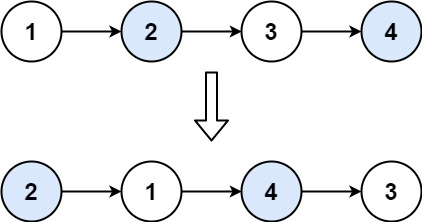문제
주어진 링크드 리스트에서 한 pair씩 swap해라.

Input: head = [1,2,3,4]
Output: [2,1,4,3]https://leetcode.com/problems/swap-nodes-in-pairs/
해결 아이디어 (iterative)
first,second노드를 지정하고 swap. 이것을 두칸식 반복하는게 기본 아이디어. 어려웠다ㅇㅇ. 비슷하게는 풀다가 답이 안나와서 솔루션 슬쩍 참고함.first->next는second->next를 가리키면 됨. 즉1번 노드가3을 가리키면 됨. 굳이 여기서 다음스텝의 swap이후 위치인4를 가리킬 필요 없음. (나는 이 부분을 틀림)- 한번에 두개씩 해결해 나가야함. (요게 핵심)
prev노드는 이전의first가 되며, 현재의second를 가리켜야함.- 생각해보면 그림대로 노드의 링크를 연결하면 되긴함..
prev는 NULL로 시작했기 때문에prev가 NULL이면newhead = second로 초기화.- 추가로 변수명을 잘 지어야한다는 사실을 또한번 깨달음. 변수명을 잘못지으면 인지부하가 급격히 증가한다.
first,second로 지으니 인지부하가 확 줄어드는게 느껴짐. - Leetcode 해설
- 1

- 2

- 3

- 1
해결 iterative
struct ListNode* swapPairs(struct ListNode* head){
struct ListNode* first = head, *prev = NULL, *second = head, *newhead = head;
while (head && head->next) {
/* initial first second */
first = head;
second = head->next;
/* swap */
first->next = second->next;
second->next = first;
if (prev)
prev->next = second;
else
newhead = second; // set newhead (only one time)
/* set a new head & prev for next step */
prev = first;
head = first->next;
}
return newhead;
}해결 recursive
핵 간단하고 천재적인 풀이법. 항상 재귀는 정답을 리턴한다. first->next에는 그다음의 모든 노드들이 정렬을 마친 첫번째 노드를 가리키게하면 된다. first->next 에 swapPairs(second->next)를 저장하고. 재귀적으로 최종 모두정렬된 노드가 리턴된다. 재귀는 참 마법같다..
struct ListNode* swapPairs(struct ListNode* head){
if (!head || !head->next)
return head;
struct ListNode* first = head, *second = head->next;
first->next = swapPairs(second->next);
second->next = first;
return second;
}